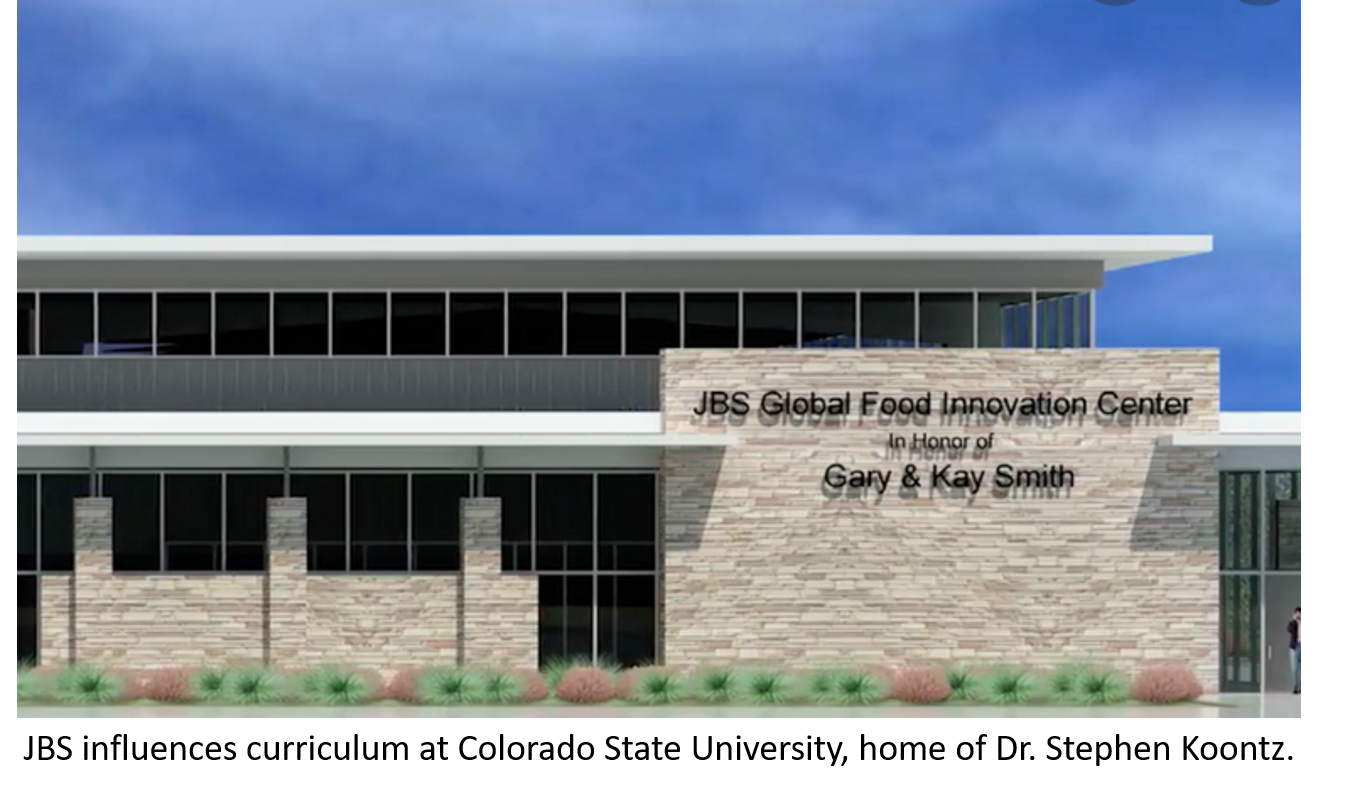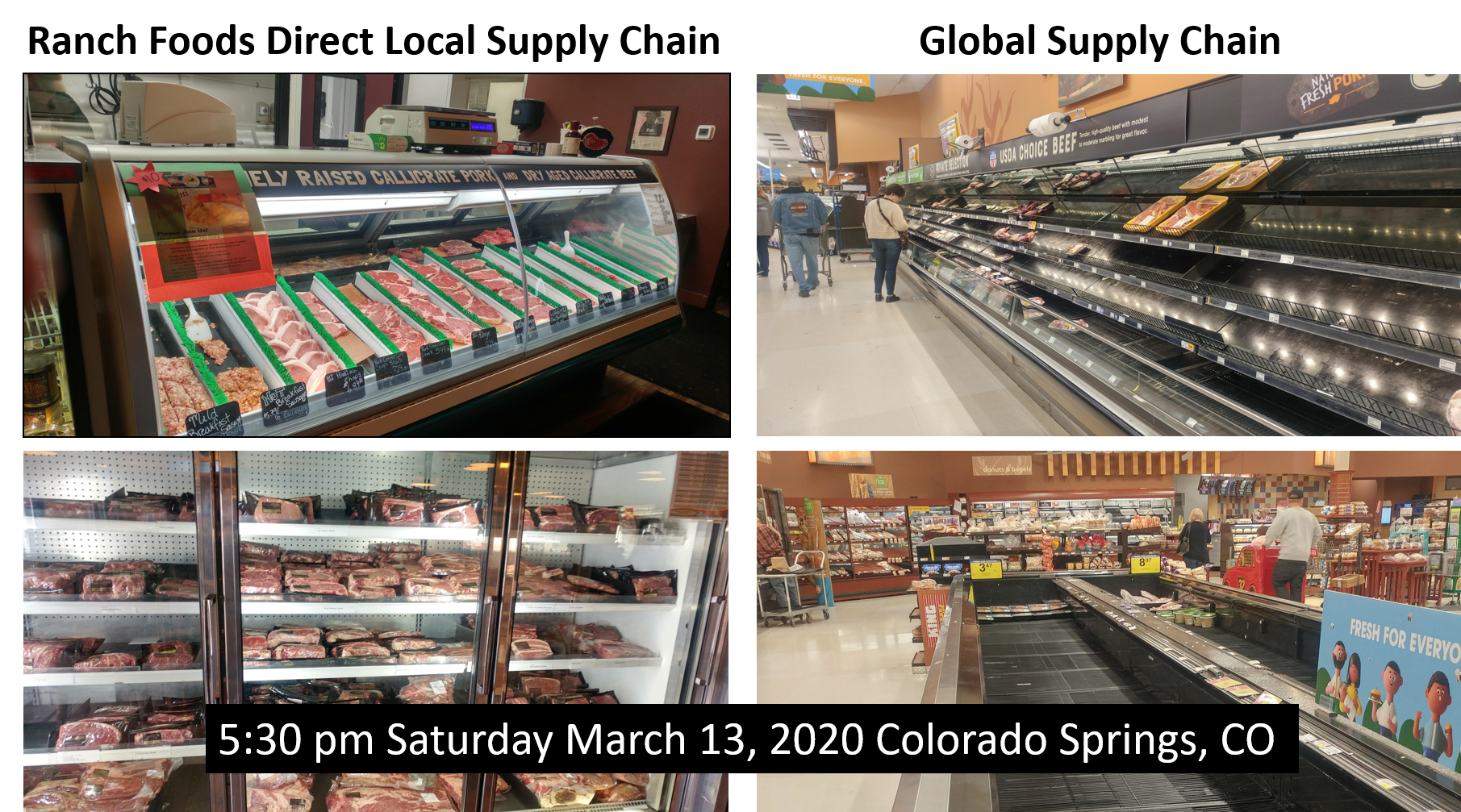The big meatpackers need us to believe that without their efficiencies we would all starve. Nothing could be further from the truth.
 In his May 2020 whitepaper concerning proposed legislation intended to help restore competition to the cattle markets, Colorado State University professor and ag economist Dr. Stephen Koontz, said, “there are almost no benefits and considerable costs due to lost efficiency and product quality” from mandating additional cash trade.
In his May 2020 whitepaper concerning proposed legislation intended to help restore competition to the cattle markets, Colorado State University professor and ag economist Dr. Stephen Koontz, said, “there are almost no benefits and considerable costs due to lost efficiency and product quality” from mandating additional cash trade.
By now, Dr. Koontz, along with many other Land Grant economists surely know better. But they religiously tout the lies of big meatpacker efficiency and economies of scale, defending the theft, the on-going market manipulation, the increasing concentration, and now near-total monopoly control over cattle producers, cattle feeders, smaller meat company competitors, and consumers. As a country, we are no longer able to feed ourselves.
“The bigger the lie, the more people will believe it”
How efficient is the cattle industry under the current highly concentrated, centrally planned structure Dr. Koontz and his colleagues have promoted for so many years? Low cattle prices have run nearly half of our ranchers out of business, forcing increasing reliance on imported cattle and beef to supply the demanding U.S. market. That’s a pretty efficient way to rid our land of good stewards while increasing our reliance on foreign suppliers. Lack of fair market access and unfair preferences to big cattle feeders has bankrupted over 84,000 independent cattle feeding operations. That’s a pretty efficient way of killing competition for calves, feeder cattle, grains, and forages. Most of the feeding operations were smaller farmer-feeders who fed the grass and crops they grew on their own land while returning the valuable manure to the soil. With the loss of smaller regional meatpackers, more cattle are being pushed faster through fewer plants, with animals traveling much further distances, suffering much greater stress, all at the expense of the producer, the animal, and meat quality.
How efficient is it to put meat in a box within 24 to 36 hours of slaughter? Boxing beef is an unnecessary step entirely. Boxed beef has been a tool of the top-down highly concentrated supply chain in reducing wages and the need for skilled workers. Small plants that produce carcasses to sell or process from carcass into retail cuts are far more efficient at putting meat on the table, as well as safer, more dependable, resilient, and with fewer food miles. Boxing beef the day after slaughter preserves the pathogens that a week of dry-aging would have eliminated. Meat contamination and recalls have never been worse, and the supply chain has never been so efficient at distributing problems nationally and globally.
How about the unskilled and exploited mostly refugee workforce in Dr. Koontz’s efficient model of meatpacking? In the two biggest Tyson/IBP plants, workers average around 1.6 animals per worker per day. This compares to around four or more animals per day in small plants like mine in St. Francis, Kansas. How efficient is it for big plant workers to receive below living wages, relying on taxpayer support to eat, along with additional support for healthcare and many other externalized costs put on the communities the big meatpacking plants call home?
What about water use? Mobile units and smaller meat plants typically use between 30 and 50 gallons of water per animal processed, compared to over 700 gallons in the large plants. And this number pales compared to the water squandered in growing below-cost-of-production, taxpayer-subsidized corn and soy for Dr. Koontz’s corporate-controlled model of production. How efficient is it to permanently deplete our precious aquifers, and other valuable resources, for the benefit of a few global corporations and their fat cat executives?
How beneficial is it for highly concentrated feeding operations and big agribusiness to destroy the environment, deplete our soils, pollute our waterways, make formerly safe water supplies undrinkable, and rural communities unlivable? How efficient will it be to clean up this mess, Dr. Koontz?

The fragile industrial supply chain fails to deliver during the COVID-19 outbreak
Efficiency should include some semblance of reliability. How reliable has Dr. Koontz’s concentrated meat model been during the COVID-19 crisis as meat counters went empty across America? The big agribusiness solution was to force desperate workers back into dangerously crowded and deadly work environments, efficiently spreading the virus throughout the workplaces and rural communities. Are dead workers and family members just a small cost of doing business in today’s efficient food system? It was the struggling, small, owner-operated, so-called inefficient plants — the ones with room to increase production — that stepped up in a safer way to feed communities during this pandemic.
The incoming Biden/Harris administration must recognize and avoid the destructive no-rules policies of the past – the very policies that turned rural America into impoverished ghettos and against both Democrats and Republicans. Reagan through Obama, and now the Trump administration, all placed corporate interests over people, enabling the current monopoly control over our food supply and this epic ongoing disaster. So far, it looks like Biden and Harris are looking to past Obama advisors for guidance on food and agriculture. This is a big mistake. President Obama killed any hope for change among farmers, ranchers, and rural America when he, Ag Secretary Vilsack, and his Justice Department antitrust cops caved in 2010 to the robber baron meatpackers.
We need a new day for family farmers and ranchers, a new day, and new policies that begin to break up the monopoly that controls our food systems, providing a real opportunity for young farmers and ranchers. We need policies that promote land stewardship instead of the current pillage and plunder, strip-mining, corporate-owned wealth extraction machine. We need a new day and new policies that support many, many more people on the land practicing animal husbandry instead of the so-called efficient factory production supported by modern animal science. We need new leadership, new policy, and a rock-solid commitment powerful enough to stand up to the money and political power big agribusiness and big retail will marshal against us.
Sadly, we are now living the failed food system Dr. Koontz and other bought-and-paid-for economists helped create. It’s an atrocity born out of a misguided and misleading definition of efficiency. Cattle producers need competitive markets, which we have not had since the early 1980s when the biggest meatpackers decided to cooperate rather than compete. The current 50/14 cash market legislation, introduced by Iowa Senator Chuck Grassley, is not at all unreasonable, but we need to go much further. Any measures that don’t break up the concentrated monopoly power in our food system will not restore a fair market for livestock or the possibility of a safe, dependable, resilient, and secure national food supply.
Yes, we can, “Build Back Better!”












